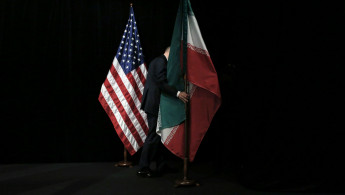Iran says alleged US spies may face death penalty
"Tens of spies", many of whom were dual nationals, were arrested in August, Iran said at the time.
Judiciary spokesman Gholamhossein Esmaili said prosecutors in a military tribunal would be seeking the death penalty in the case of an unspecified number of suspects, state television reported.
"Two of the defendants, who were not military, have received long prison terms," Esmaili added, without giving details.
The case comes just a month after Iran executed a "defence ministry contractor" convicted of spying for the US Central Intelligence Agency.
"The execution sentence was carried out for Jalal Haji Zavar, a contractor for the defence ministry's aerospace organisation who spied for the CIA and the American government," ISNA reported, quoting the Iranian military.
ISNA said he was convicted by Iran's military court and that he was executed, at an unspecified time, at the Rajayi Shahr prison in the city of Karaj, west of Tehran.
It was not specified when Zavar was arrested, noting however that his contract with the defence ministry had been terminated during the Iranian year 1389 (March 2010-2011).
He was identified as a spy by the defence ministry's intelligence unit, ISNA said.
During the investigation the suspect "explicitly confessed to spying for the CIA" in return for money, ISNA said, adding that "documents and espionage devices were found at his house".
Zavar's ex-wife was convicted of "involvement in espionage" and is serving a 15-year jail sentence.
The report came days after Iran said it had dismantled a "new" US spy network in the country linked to the CIA, amid escalating tensions between Tehran and Washington.
In what it termed a "wide-reaching blow" to US intelligence, state news agency IRNA said on Tuesday that Tehran had carried out the operation in cooperation with "foreign allies", without naming any state.
Tensions between Washington and Tehran flared up after Iran, on Tuesday, said it shot down a US "spy" drone which violated its airspace - a claim the US denies - near the strategic Strait of Hormuz.
In response, the US was ready to carry out a military strike against Iran.
The downing of the drone came after tensions spiked between the two countries following a series of attacks on oil tankers the US has blamed on Iran.
Iran announced in May that it would no longer respect the limit set on its enriched uranium and heavy water stockpiles.
The move was seen as a way of exerting pressure on Europe to try and salvage the deal which has been hanging by a thread since US President Donald Trump announced that he was withdrawing from the accord and reimposing biting sanctions on Tehran.
On Monday, Foreign Minister Mohammad Javad Zarif said Iran had now exceeded the limit on its enriched uranium reserves.
Follow us on Twitter: @The_NewArab





 Follow the Middle East's top stories in English at The New Arab on Google News
Follow the Middle East's top stories in English at The New Arab on Google News
![The UAE is widely suspected of arming the RSF militia [Getty]](/sites/default/files/styles/image_330x185/public/2024-11/GettyImages-472529908.jpg?h=69f2b9d0&itok=Yauw3YTG)
![Netanyahu furiously denounced the ICC [Getty]](/sites/default/files/styles/image_330x185/public/2024-11/GettyImages-2169352575.jpg?h=199d8c1f&itok=-vRiruf5)
![Both Hamas and the Palestinian Authority welcomed the ICC arrest warrants [Getty]](/sites/default/files/styles/image_330x185/public/2024-11/GettyImages-2178351173.jpg?h=199d8c1f&itok=TV858iVg)